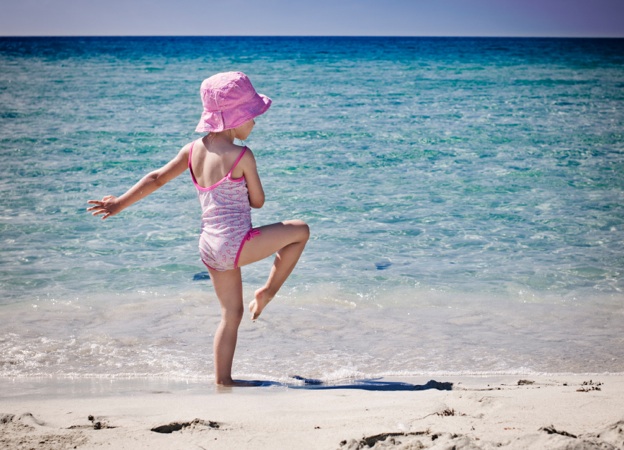SingaporeMotherhood | Parenting
September 2012
Shake That Little Booty!

I recently attended a dance festival in which my eight-year-old daughter was performing. I watched the performances with my young sons and we had a grand time, with the little boys bobbing along to the music! The room was filled with excitement and enthusiasm, and all of us parents were left feeling deeply appreciative of the dance teachers’ efforts and the girls’ motivation.
As I watched some of the dances though, I felt conflicted. It felt all wrong watching little girls, dressed in body-hugging clothes with lots of make-up, performing suggestive dance moves to lyrics laden with sexual innuendo and adult themes. While many dances are art forms, it is undeniable that some movements have a sexual element.
Children have no idea about their world, and they accept our behaviour without question; as the adults, we influence what they believe is real and normal. When parents and teachers dress little girls up and applaud sexy looks and behaviour, what are we saying to our girls?
[banner][/banner]
I want my kids to learn about their bodies and their sexuality. This learning begins at a young age, well before kids understand what sex is. It builds on all their experiences, even on those that aren’t directly about sex, say authors Levin and Kilbourne in So Sexy, So Soon: The New Sexualized Childhood & What Parents Can Do to Protect Their Kids. What concerns me are the messages my children are getting about their sexuality.
In the book, the authors discuss that society’s messages suggest to children that their worth comes from their physical attractiveness and sex appeal. These messages shape their gender identities, sexual attitudes and capacity to form relationships. Research also shows that when children, especially girls, are treated as sex objects, their adolescent development is stunted and they are more prone to depression, eating disorders and low self-esteem.
I want my daughter to know that her self-worth is not measured by how ‘hot’ she is; I do not want her to lose the innocence of childhood by worrying about her sexual attractiveness. For my sons, I want them to learn that being strong is about being gentle and sensitive, not being macho. I want them to value women as individuals, instead of holding them against artificial and impossible standards.
When my daughter was born, I wondered about fairytales; the strong women in fairytales are usually the witches and stepmothers, while the kind and beautiful fairytale heroines tend to be distressed damsels waiting to be rescued. Snow White cooked and cleaned the dwarves’ home while waiting for her prince to come. I didn’t want my daughter learning to be helpless, subscribing to ideas on stereotypical gender roles or thinking that she will have a perfect ‘happy ever after’.
Yet, fairytales bring a sense of balance and simplicity; good triumphs. I wanted to offer my daughter this comfort. As Gisela Preuschoff says in Raising Girls: Why Girls Are Different and How to Help Them Grow up Happy and Strong, fairytales use metaphor and allegory to tell children that by facing impossible tasks and dangerous situations with courage and perseverance, they too can find a way to their own kingdom.
I also thought about dolls and toys that I introduced my daughter to. I was careful about not letting her play with dolls which wore heavy make-up, were sexualised or were society’s image of the ideal woman. I wanted my toddler girl to have the opportunity to define beauty her way; I didn’t want her to have to conform to what pop culture says she should look like!
It was easy for me to control most of what my kids were exposed to when they were little. When my older kids began attending primary school and bringing home different ideas (and dance moves!), I quickly realised that I had to let go and learn new ways of dealing with ideas that weren’t aligned with mine.
I have established limits surrounding my kids’ consumption of media such as tv programmes and the Internet. I realise that I need to define for myself the ideas I want my children surrounded by, and structure our home consciously.
I make use of pockets of time to talk with each child about his feelings, thoughts and experiences every day. Yet, during these unguarded moments, I often struggle to find the right words to express myself; my kids often ask questions I don’t know how to answer. Their innocuous comments reveal double standards I may not have been aware of or grey areas that I had never thought about.
Dancing with childlike abandon to silly, made-up songs has been a source of laughter and family fun in our home; however, I find it difficult to explain the sexual undertones in gyrating movements, all the more conflicting because I grew up listening to hip hop, reggae and R&B music and watching dance music videos. I have no words to explain to my daughter how it is that the dance movements she learns from dance instructors are inappropriate.
I encourage my youngsters to stay active through sports and play, by climbing trees, riding scooters or doing gymnastics. Enjoying the rush that exercise brings is part of loving their bodies and movement! Getting involved in sports celebrates skills and abilities over physical appearance.
I realise that as a mother, I play an important role in helping my kids understand sexual ideas. The beliefs that I hold dear will be the same ones that they learn are important; the positive or negative comments I make about my body are the ones my kids will use on their own bodies. As I nurture and appreciate myself, my children will do the same for themselves.
All content from this article, including images, cannot be reproduced without credits or written permission from SingaporeMotherhood.
Follow us on Facebook, Instagram, and Telegram for the latest article and promotion updates.






